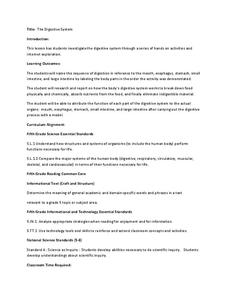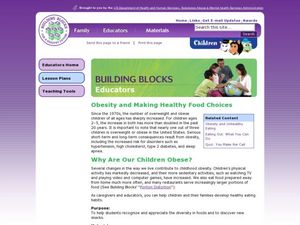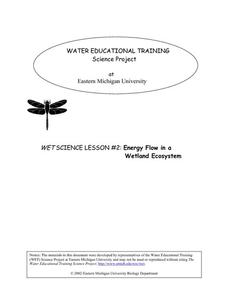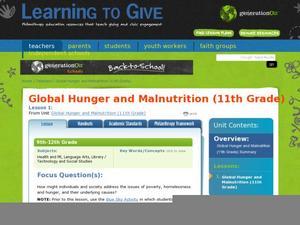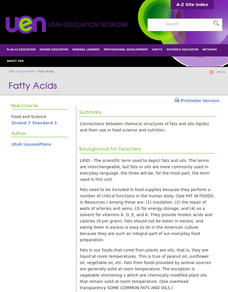Curated OER
Non-nutrients: Fiber and Water
Students will identify the sources and function of carbohydrates and fiber and apply appropriate food preparation techniques.
University of Georgia
Bag O' Isotopes
Accommodate your chemistry class with an experiment that is both entertaining and educational. Through the activity, blossoming chemists perform calculations on various isotopes, as represented by beans and legumes, to obtain the average...
Virginia Department of Education
Changes in Ecosystems
How does water pollution affect the environment? Provide your class with the resources to answer this question as they learn about eutrophication and ecosystem changes. Over two weeks, they simulate the effects of pollution on the...
Curated OER
Abbreviations, Substitutions, Equivalents, Cooking Terms
Students review abbreviations of words used in recipes, acceptable substitutions of foods in recipes, standard equivalents of measurements and correct terminology of cooking terms through the use of written assignments.
Curated OER
Measuring Techniques - Level I
Demonstrate food preparation techniques of salads, soups, casseroles, breads, meats, poultry and pastries.
Curated OER
The Digestive System
Discover how the human body's digestive system works with a brain and stomach friendly activity. Scholars taste test a variety of foods to find out how they behave once in the mouth. Class members then play a game called Move That...
Curated OER
Obesity and Making Healthy Food Choices
Students determine healthy snack choices for themselves. In this eating habits lesson, students discuss snacks they regularly consume. Students cut and paste pictures of snacks that they think are good selections.
Curated OER
What is an Ecological Footprint?
Introduce youngsters to the term ecological footprint. Learners identify ways in which humans affect the environment. They look at the problems associated with the use of natural resources, and focus on ways to preserve natural...
Eastern Michigan University
Energy Flow in a Wetland Ecosystem
How is energy transferred within an ecosystem? What would happen to a food web if one of the organisms was removed? Elementary or middle school ecologists examine these questions and more in a comprehensive 5E learning cycle lesson....
Curated OER
Global Hunger and Malnutrition
Is there a difference between hunger and malnutrtion? Is this a problem only in third world countries? How does hunger and malnutrition affect the community? Why do these problems exist when the world produces enough food to feed...
ARKive
Dinner at the Reef
Fine dining can happen anywhere, even in the coral reefs. Budding environmentalists explore marine food chains, predator-prey relationships and the importance of a balanced ecosystem. These important concepts are facilitated through a...
Curated OER
Microbes
Microbiology beginners feed different sweetening agents to yeast and measure carbon dioxide production to estimate energy contained in each. They set the trials up in zip-top plastic baggies and then measure gas volume by water...
Science Matters
Ring of Fire
Over a period of 35 years, earthquakes and volcanoes combined only accounted for 1.5 percent of the deaths from natural disasters in the United States. The 15th lesson in a 20-part series connects the locations of earthquakes and...
Rainforest Alliance
Investments in Forest Carbon
One hundred metric tons of CO2 can accumulate in one acre of forest over time—that's a lot of carbon! In the activity, groups of middle school learners determine what makes forests important. They then solidify the concept by using a...
Curated OER
Measuring Techniques - Level I
Students, in groups, carry out a recipe and successfully prepare food. After they finish making the product, they compare each group's products and complete "Evaluation of Crunchy Munchy Chocolate-Peanut Goop."
Curated OER
Kitchen Vocabulary Words
Working in groups of four, class members sort cards, labeled with kitchen equipment vocabulary words, into groups based on function, i.e., mixing tools, measurement tools, serving tools, baking pans, stove top pans, or preparation tools....
Curated OER
Social Studies: Food and Dining in Cameroon
Students review their findings on Cameroon and play a vocabulary game. Using provided recipe packets, they present a mock cooking show with a student narrating in French. They role-play as exchange students and write letters home about...
Curated OER
Homelessness:Key Terms
Young scholars explore the concept of homelessness. In this social issues lesson, students research homelessness through key terms, in order explore the concept in more depth.
Curated OER
Testing for Vitamin C in different drinks and foods
Students develop an awareness of the use of Vitamin C in helping our environment and gain exposure to chemical procedures and techniques. Students analyze and interpret data by keeping a data sheet and making a bar graph.
Virginia Department of Education
Predator-Prey Simulation
Do your pupils have the misconception that environmental predators are "bad" and harm smaller creatures? The simulation explains, in detail, the important role predators play in maintaining a stable ecosystem. Through web-based research,...
Virginia Department of Education
Owl Family Natural Selection
How do genetic mutations within a population lead to future variations? Provide your class with the resources to answer this question and more upon completing an activity on natural selection. The entire class participates in a fun role...
Curated OER
What Lives in Water?
In this early childhood science worksheet set, students study the importance of water, and determine the difference between themselves and water dwellers. They look at adaptations, river life, rainforest life, food chains, pollution, and...
Curated OER
Fatty Acids
Identify the properties of fats and lipids. Compare the properties of saturated and unsaturated fatty acids Identify foods containing triglycerides and identify which foods contain saturated and unsaturated fat Discuss the function of...
Curated OER
Calorie Connection
Students calculate the calories in a Brazil nut and the calories needed for daily intake. In this calories lesson plan, students use calorimetry to measure the change in water temperature heated by the burning of a Brazil nut. They also...







